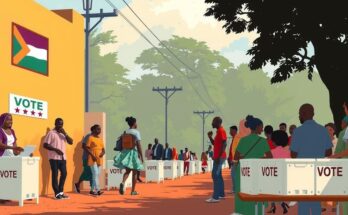Mozambique is experiencing significant unrest following the disputed elections on October 9, 2024, in which the ruling Frelimo party maintained power. At least 30 fatalities have been reported amid ongoing protests, drawing regional concern as Mozambique is a pivotal player in Southern African trade. This unrest threatens not only political stability but also economic operations in the region, emphasizing the broader challenges of electoral integrity across Southern Africa.
The political landscape in Mozambique has been fraught with controversy following the disputed election outcomes on October 9, 2024, which resulted in the ruling Frelimo party continuing its longstanding dominance under Daniel Chapo. This has led to significant civil unrest, with thousands protesting against the legitimacy of the election results. Reports indicate that over thirty individuals have lost their lives due to the ensuing violence, raising alarm among neighboring nations, thereby placing the issue of Mozambique’s political stability on the agenda for the upcoming Southern African Development Community (SADC) summit. This turmoil is particularly concerning for Southern Africa as it reflects broader regional challenges regarding democratic governance and electoral integrity. Several nations in the region, including South Africa and Botswana, have recently experienced relatively stable and credible elections. South Africa’s opposition recently gained a foothold, and Botswana witnessed a peaceful transfer of power after nearly six decades. However, Mozambique’s situation casts a shadow on these advancements, as allegations of election irregularities from the European Union’s observer mission highlight a troubling trend of disputed elections within the region. The ongoing unrest in Mozambique poses economic ramifications, as the country is a critical hub for trade within Southern Africa. Border closures, including South Africa’s response to the protests, have disrupted the flow of goods, significantly impacting the economy. Estimates indicate daily losses exceeding R10 million (approximately $555,177) due to these interruptions, which could hamper regional economic collaboration, particularly affecting exports through key routes such as the Maputo harbor. Additionally, the political instability in Mozambique is compounded by its historical context. The nation is still recovering from a protracted civil war and the persistent threat of violence from insurgent groups in the Cabo Delgado province poses further challenges. With hundreds of thousands of ill-fated refugees seeking solace in neighboring countries, any resurgence of unrest could exacerbate cross-border migration issues.
Mozambique has a complex history, having faced a brutal civil war that ended over two decades ago and is still grappling with the impact of violence and instability. The recent election on October 9, 2024, solidified Frelimo’s authority while sparking widespread protests by opposition parties and citizens who challenge the election’s validity. The ensuing turmoil has raised flags among regional leaders, particularly as Mozambique plays a crucial role in Southern Africa’s trade network, influencing economies across neighboring nations. Past irregularities in Mozambique’s elections have drawn criticism, setting a precedent for current disputes and highlighting the fragility of democracy within the region.
The post-election violence in Mozambique serves as a critical reminder of the ongoing struggles within Southern Africa regarding electoral integrity and political stability. As the country grapples with the aftermath of its disputed elections, the repercussions extend beyond its borders, ushering in economic disruptions and potential refugee crises. The situation underscores the need for the Southern African region to work collectively towards strengthening democratic processes and ensuring political accountability, while safeguarding economic interests amid instability.
Original Source: apnews.com




